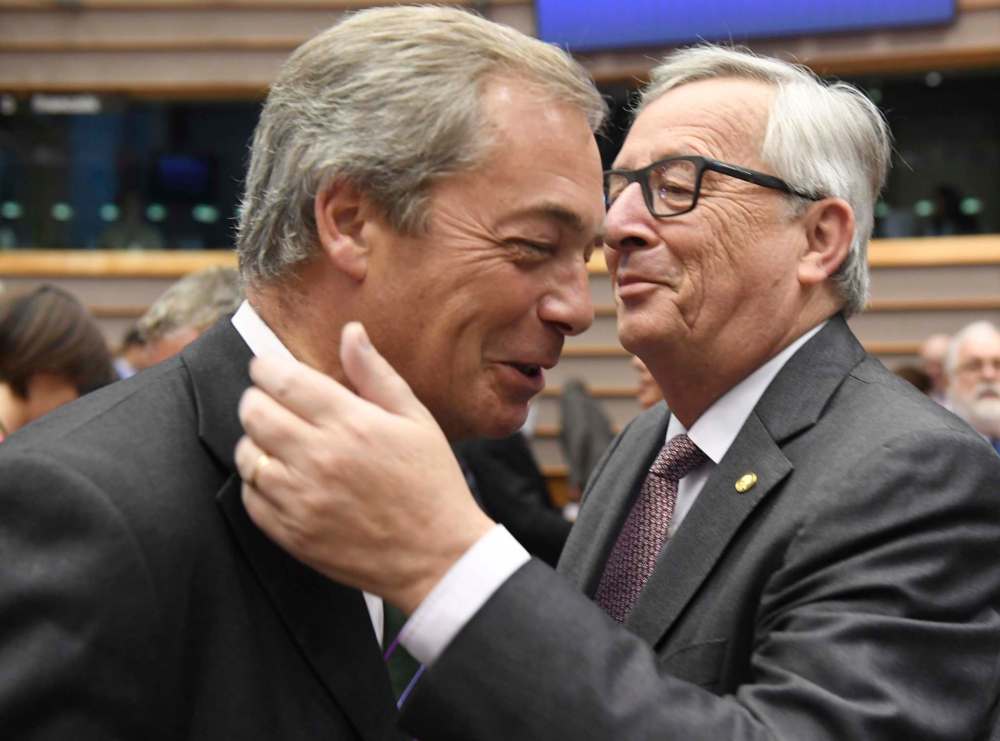Brexit politicians are agents of chaos
Advertisement
Read this article for free:
or
Already have an account? Log in here »
To continue reading, please subscribe:
Monthly Digital Subscription
$0 for the first 4 weeks*
- Enjoy unlimited reading on winnipegfreepress.com
- Read the E-Edition, our digital replica newspaper
- Access News Break, our award-winning app
- Play interactive puzzles
*No charge for 4 weeks then price increases to the regular rate of $19.00 plus GST every four weeks. Offer available to new and qualified returning subscribers only. Cancel any time.
Monthly Digital Subscription
$4.75/week*
- Enjoy unlimited reading on winnipegfreepress.com
- Read the E-Edition, our digital replica newspaper
- Access News Break, our award-winning app
- Play interactive puzzles
*Billed as $19 plus GST every four weeks. Cancel any time.
To continue reading, please subscribe:
Add Free Press access to your Brandon Sun subscription for only an additional
$1 for the first 4 weeks*
*Your next subscription payment will increase by $1.00 and you will be charged $16.99 plus GST for four weeks. After four weeks, your payment will increase to $23.99 plus GST every four weeks.
Read unlimited articles for free today:
or
Already have an account? Log in here »
Hey there, time traveller!
This article was published 05/07/2016 (3424 days ago), so information in it may no longer be current.
“You know what I am? I’m a dog chasing cars. I wouldn’t know what to do with one if I caught it! I just do things.”
That’s Heath Ledger as the Joker, in Christopher Nolan’s The Dark Knight, explaining what compels him to do what he does as a self-described “agent of chaos.”
Who could blame those in the U.K. for viewing David Cameron, Nigel Farage and Boris Johnson as Joker wannabes who caught the car and had no idea what to do next?

Mr. Cameron called for a referendum on whether the U.K. should stay in the European Union as a way of staving off the anti-EU supporters within his party. It was supposed to be a low-risk ploy, calculated to demonstrate his political credibility, but it blew up in his face, leaving Mr. Cameron with little choice but to step down in October, something he said he wouldn’t do earlier in the campaign.
Mr. Farage resigned Monday as the leader of the U.K. Independence Party, saying he wanted his life back and he wanted to take a rest. “The victory for the Leave side in the referendum means that my political ambition has been achieved,” he said. “I came into this struggle from business because I wanted us to be a self-governing nation, not to become a career politician.”
That resignation followed an announcement from Mr. Johnson — a Tory MP and an organizer for the Leave side — that he would not be pursuing the leadership of the Conservatives, much to the astonishment of most observers in Britain. The former London mayor was thought to be the presumptive leader, after Mr. Cameron announced his resignation. However, Mr. Johnson’s friend and collaborator Michael Gove turned on him and announced that he would seek the leadership instead, suggesting that Mr. Johnson did not have leadership abilities. Now, it’s not clear what his future will be, but Mr. Johnson’s support of the Leave side was viewed by many as more of an attempt to oust Mr. Cameron than to actually orchestrate a divorce from the EU.
What this means now is the three architects of the referendum have all stepped away from leading Britain through the process of separation, leaving behind chaos and no plan. While Germany’s Angela Merkel has been the voice of caution in response to pressure from other European leaders pushing for a quick exit, she cautions the divorce from the EU “shouldn’t take forever.” But the way forward is unclear.
In Canada, the Brexit vote has brought up old memories of the 1995 Quebec referendum that saw this country come uncomfortably close to splitting apart. The emotions following that vote also resulted in resignations and recriminations, although not nearly at the same level as what’s happening in the U.K. right now.
Parti Québécois leader Jacques Parizeau, who triggered a referendum in 1995 following the failure of the Meech Lake Accord and the rise of the Bloc Québécois federally, was extremely bitter after the narrow loss. In April 2016, Quebec’s provincial library released footage of a recorded message from Mr. Parizeau that clearly outlined the next steps should the Yes side win. In his message, Mr. Parizeau laid out his plan for Quebec, including a timeline of one year for the unilateral declaration of independence.
For Mr. Parizeau, Quebec’s independence was his raison d’etre, it wasn’t a means to an end. He clearly had no intention of winning the separatist vote and then walking away. And regardless of whether you agree with him or not, looking at the mess unfold in Britain you have to at least admire Mr. Parizeau’s vision and commitment.
Mr. Cameron, Mr. Farage and Mr. Johnson could learn a lot from his example.
History
Updated on Tuesday, July 5, 2016 12:22 PM CDT: fixes typo


